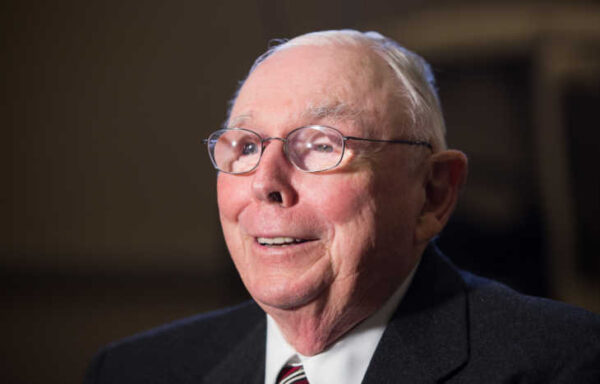I Was Batboy to the Greatest Slugger of Them All
When you think about sluggers and their batboys, you might envision Hank Aaron or Ted Williams. (Or, if you’re a DC Comics fan, Batman and Robin.)
But I’m referring to a different slugger, one even more paunchy than Babe Ruth: Warren Buffett.
Over the last three decades, I’ve learned a lot from the chairman of Berkshire Hathaway (NYSE: BRK-B), the most successful value investor of all time.
When I was a young man starting out in the money management business in 1985, he didn’t just educate me about financial markets. He taught me a lot about life.
Click here to watch Alex’s latest video update.
One particular quote that resonated with me was this gem: “The key to life is to figure out who to be the batboy for.”
Whenever we are novices – starting a fresh career, a new sport or the investing game – we have to be honest with ourselves.
We have a great deal of ignorance, little or no experience, and probably more than a few misconceptions.
It’s foolish, expensive and time-consuming to learn everything the hard way. (Although I’m convinced that certain life lessons cannot be fully appreciated any other way.)
Better to find a mentor – someone with great knowledge, decades of experience and plenty of integrity – who is willing to share what he or she has learned.
Such people are rare. But when you find them, sit at their knee. Or, in Buffett’s memorable phrase, be their batboy.
Buffett was batboy to Benjamin Graham, the father of value investing and author of Security Analysis. Published in 1934, it is one of the very few undisputed investment classics.
Graham taught Buffett to forget about the market and concentrate on individual businesses.
Look at their sales. Examine their earnings. Calculate their profit margins. And make sure there is a “moat” – a sustainable competitive advantage – that protects the company from the ravages of competition.
As a young man just starting out on Wall Street, I was surrounded by colleagues with a great deal of experience.
Yet it never ceased to amaze me how little of real value they actually knew.
Some were trying (and failing) to forecast the economy. Others were trying (and failing) to time the market. Still others were full of arcane data that showed a correlation between various factors – like Fed policy and stock market movements – that had no real-world application.
So I decided to become a batboy to Buffett himself, even though I never met the man.
I read his annual shareholder reports, especially the entertaining and informative chairman’s letter.
I listened to his interviews and speeches, long before any of the modern financial channels – or the internet – even existed.
Buffett reminded me that stocks are a better long-term investment than bonds, that the best investors have not big brains but strong stomachs, and that the biggest gains come from analyzing businesses not market trends.
He has always been forthright and accessible in his views.
Twenty years ago, he warned investors against the bubble in internet stocks. Twelve years ago, he warned investors against the bubble in housing.
And the bubble in cryptocurrencies? He called bitcoin “rat poison squared.”
Buffett also pointed out exceptional buying opportunities, especially during severe market downturns.
As the financial crisis unfolded in the fall of 2008, for example, he wrote an op-ed piece in The New York Times suggesting that investors take advantage of the bloodbath in the market. He said…
Let me be clear on one point: I can’t predict the short-term movements of the stock market. I haven’t the faintest idea as to whether stocks will be higher or lower a month – or a year – from now. What is likely, however, is that the market will move higher, perhaps substantially so, well before either sentiment or the economy turns up. So if you wait for the robins, spring will be over.
(If you’ve ever wondered why Buffett’s advice sounds similar to mine, well, now you know why.)
Had you followed Buffett’s advice in 2008 and done no better than the S&P 500 over the next decade, your portfolio would still be up manyfold.
I was fortunate that I chose to be a batboy for Buffett. (And for other investment greats like Peter Lynch and John Templeton.)
About Alexander Green
Alexander Green is the Chief Investment Strategist of The Oxford Club, the world’s largest financial fellowship. For 16 years, Alex worked as an investment advisor, research analyst and portfolio manager on Wall Street. After developing his extensive knowledge and achieving financial independence, he retired at the age of 43.
Since then, he has been living “the second half of his life.” He runs The Oxford Communiqué, one of the most highly regarded publications in the industry. He also operates three fast-paced trading services: The Momentum Alert, The Insider Alert and Oxford Microcap Trader. In addition, he writes for Liberty Through Wealth, a free daily e-letter focused on financial freedom.
Alex is also the author of four New York Times bestselling books: The Gone Fishin’ Portfolio: Get Wise, Get Wealthy… and Get On With Your Life; The Secret of Shelter Island: Money and What Matters; Beyond Wealth: The Road Map to a Rich Life; and An Embarrassment of Riches: Tapping Into the World’s Greatest Legacy of Wealth.







